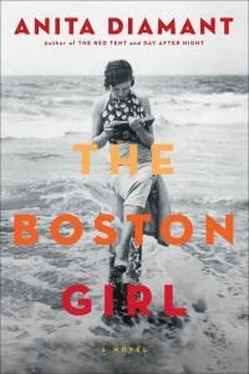Thank you for downloading this Scribner eBook.
Sign up for our newsletter and receive special offers, access to bonus content, and info on the latest new releases and other great eBooks from Scribner and Simon & Schuster.
CLICK HERE TO SIGN UP
or visit us online to sign up at
eBookNews.SimonandSchuster.com
For Robert B. Wyatt and S.J.P.
| 1985 |
Nobody told you?
Ava, sweetheart, if you ask me to talk about how I got to be the woman I am today, what do you think I’m going to say? I’m flattered you want to interview me. And when did I ever say no to my favorite grandchild?
I know I say that to all of my grandchildren and I mean it every single time. That sounds ridiculous or like I’m losing my marbles, but it’s true. When you’re a grandmother you’ll understand.
And why not? Look at the five of you: a doctor, a social worker, two teachers, and now you.
Of course they’re going to accept you into that program. Don’t be silly. My father is probably rolling over in his grave, but I think it’s wonderful.
Don’t tell the rest of them, but you really are my favorite and not only because you’re the youngest. Did you know you were named after me?
It’s a good story.
Everyone else is named in memory of someone who died, like your sister Jessica, who was named for my nephew Jake. But I was very sick when you were born and when they thought I wasn’t going to make it, they went ahead and just hoped the angel of death wouldn’t make a mistake and take you, Ava, instead of me, Addie. Your parents weren’t that superstitious, but they had to tell everyone you were named after your father’s cousin Arlene, so people wouldn’t give them a hard time.
It’s a lot of names to remember, I know.
Grandpa and I named your aunt Sylvia for your grandfather’s mother, who died in the flu epidemic. Your mother is Clara after my sister Celia.
What do you mean, you didn’t know I had a sister named Celia? That’s impossible! Betty was the oldest, then Celia, and then me. Maybe you forgot.
Nobody told you? You’re sure?
Well, maybe it’s not such a surprise. People don’t talk so much about sad memories. And it was a long time ago.
But you should know this. So go ahead. Turn on the tape recorder.
—
My father came to Boston from what must be Russia now. He took my sisters, Betty and Celia, with him. It was 1896 or maybe 1897; I’m not sure. My mother came three or four years later and I was born here in 1900. I’ve lived in Boston my whole life, which anyone can tell the minute I open my mouth.
| 1915–16 |
That’s where I started to be my own person.
Where I lived in the North End when I was a little girl wasn’t so quaint. The neighborhood smelled of garbage and worse. In my building to go to the bathroom, we had to walk down three flights from our apartment to the outhouses in back. Those were disgusting, believe me, but the stairways were what really scared me. At night, you couldn’t see your hand in front of your face and it was slippery from all the dirt and grease. One lady broke a leg on those steps and she never walked right again afterward.
In 1915, there were four of us living in one room. We had a stove, a table, a few chairs, and a saggy couch that Mameh and Papa slept on at night. Celia and I shared a bed in a kind of narrow hallway that didn’t go anywhere; the landlords chopped up those apartments to squeeze in more people so they could get more rent. The only good thing about our place was that we had a window that looked out on the street so there was a little light; a lot of the apartments faced the air shaft, where it was always the middle of the night.
Mameh didn’t like it when I looked out the window. “What if someone saw you there?” she’d say. “It makes you look like you have nothing better to do.”
I didn’t understand why it bothered her but I kept my mouth shut so I wouldn’t get a smack.
We were poor but not starving. Papa worked in a belt factory as a cutter and Celia was a finisher at a little shirtwaist factory upstairs over an Italian butcher shop. I don’t think we called it a sweatshop back then, but that’s what it was. And in the summer, it was steaming hot. When my mother wasn’t cooking or cleaning, she was mending sheets for the laundry across the street. I think she got a penny apiece.
Together, they made enough money for rent and food. Mostly I remember eating potatoes and cabbage, and I still can’t stand the smell of cabbage. Sometimes Mameh took in a boarder, usually a man right off the boat who needed a place to flop for a few nights. I didn’t mind because she didn’t yell so much if one of them was in the house, but they made Celia nervous.
Celia was “delicate.” That’s what Mameh called her. My sister was thin and had high cheekbones like my father, blue eyes, and fine brown hair like him, too. She would have been as pretty as the drawings in the magazines, but she was so shy that she winced when people talked to her, especially the men Mameh pushed at her.
Celia didn’t like to go out of the house; she said it was because her English was bad. Actually she understood a lot but she wouldn’t talk. My mother was like that, too. Papa managed a little better, but at home we only spoke Yiddish.
When Mameh talked about Celia to the neighbors, she said, “Twenty-nine years old already,” like it was a death sentence. But in the next breath she’d brag, “My Celia has such golden hands, she could sew the wings on a bird. And such a good girl: modest, obedient, never gives me any trouble.”
I was “the other one.”
“The other one is almost fifteen years old and still in school. Selfish and lazy; she pretends like she can’t sew.” But I wasn’t pretending. Every time I picked up a needle I stabbed myself. One time, when Mameh gave me a sheet to help with her sewing, I left so many little bloodstains she couldn’t wash them out. She had to pay for the sheet, which cost her I don’t know how many days of work. I got a good smack for that, I can tell you.
You wouldn’t know Celia and I were sisters from looking at us. We had the same nose—straight and a little flat—and we were both a little more than five feet. But I was built like my mother, solid but not fat, and curvy starting at thirteen. I had Mameh’s thin wrists and her reddish-brownish hair, which was so thick it could break the bristles on the brush. I thought I was a real plain Jane except for my eyes, which are like yours, Ava: hazel, with a little gold circle in the middle.
I was only ten years old when my oldest sister, Betty, moved out of the house. I remember I was hiding under the table the day she left. Mameh was screaming how girls were supposed to live with their families until they got married and the only kind of woman who went on her own was a “kurveh.” That’s “whore” in Yiddish; I had to ask a kid at school what it meant.
After that, Mameh never said Betty’s name in public. But at home she talked about her all the time. “A real American,” she said, making it sound like a curse.
But it was true. Betty had learned English fast and she dressed like a modern girl: she wore pointy shoes with heels and you could see her ankles. She got herself a job selling dresses downtown at Filene’s department store, which was unusual for someone who wasn’t born in this country. I didn’t see her much after she moved out and I missed her. It was too quiet without Betty in the house. I didn’t mind that there was less fighting between her and Mameh, but she was the only one who ever got Celia and my father to laugh.
Home wasn’t so good but I liked going to school. I liked the way it felt to be in rooms with tall ceilings and big windows. I liked reading and getting As and being told I was a good student. I used to go to the library every afternoon.
Читать дальше












